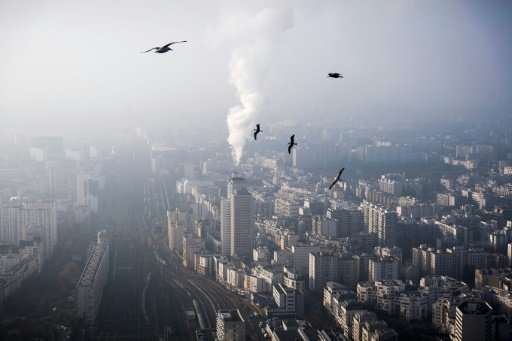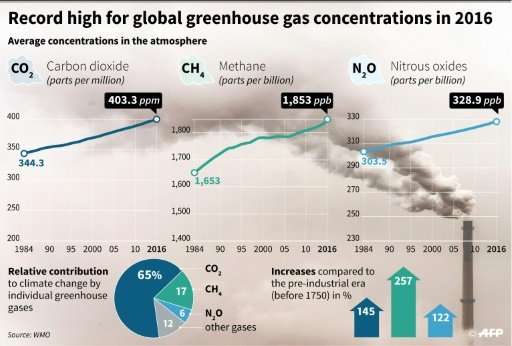Shortfall in climate action is 'catastrophic': UN

There is a "catastrophic" gap between national pledges to reduce greenhouse gas emissions and the actions needed to cap global warming below two degrees Celsius, the UN's environment chief warned Tuesday, days ahead of global climate talks in Bonn.
Even if fulfilled, these pledges—inscribed along with the 2 C target in the 2015 Paris climate pact—would see the world heat up 3 C (5.6 F), unleashing deadly heatwaves, superstorms and rising seas, UN Environment said in its annual Emissions Gap report, the bleakest ever.
Record-setting extreme weather in 2017—including monsoon flooding, raging fires and deadly hurricanes—likely bears the fingerprint of global warming, it noted.
"One year after the Paris Agreement entered into force, we still find ourselves in a situation where we are not doing nearly enough to save hundreds of millions of people from a miserable future," said Eric Solheim, head of the UN agency.
"Governments, the private sector and civil society must bridge this catastrophic climate gap."
Compiled by more than 200 climate scientists and experts, the annual, 100-page analysis tracks progress toward the Paris goal of checking the rise in global temperatures at "well below" 2 C.
With many poor nations already feeling the sting of a planet out of kilter with only one degree of warming, the treaty also vowed to explore the feasibility of holding the line at 1.5 C.
Current commitments for slashing pollution take us only a third of the way toward the 2 C target, and would eat up 80 percent of humanity's "carbon budget"—the amount of CO2 we can spew into the atmosphere without crossing that threshold—by 2030, the report said.
It doesn't help that the United States, the world's second largest emitter, has abandoned its greenhouse gas goals under Donald Trump.
Sense of emergency
"Momentum is clearly faltering," said Edgar Gutierrez-Espeleta, Costa Rica's environment minister and president of the current UN Environment Assembly.
"We face a stark choice: up our ambition, or suffer the consequences."
If the gap is not closed by 2030, the report said, "it is extremely unlikely that the goal of holding global warming to well below 2 C can still be reached."
To stay on the 2 C track, humanity must cut its emissions to about 42 billion tonnes of CO2 or its equivalent by 2030 from last year's 52 billion tonnes.

But even with carbon cutting pledges from more than 190 nations, carbon pollution in 2030 is set to rise to 53 billion tonnes. Without them, emissions shoot up to 60 billion tonnes.
"The report is a good counter-weight to some of the optimism out there about global CO2 emissions more-or-less stalling for the last two years," said contributing author Oliver Geden, a researcher at the German Institute for International and Security Affairs.
"It highlights the sense of emergency."
Under the UN climate talks, countries will not revisit their pledges until 2020—"the last opportunity to close the 2030 emissions gap," the report said.
But ramping up of national commitments, experts agree, will not be enough, and the UN report highlights other needed actions.
On the edge
One is the rapid phase out of coal. If all the coal-fired power plants in the world operate to the end of their lifetimes, the report noted, it would add the equivalent of five years' global CO2 emissions to the atmosphere.
"Phasing out coal plants and avoiding building new ones is no longer a choice, it is an imperative," said Gutierrez-Espeleta.
A global tax of $100 per tonne of CO2 would help speed the transition from dirty to clean, renewable energy.
Withdrawing fossil fuel subsidies that still total hundreds of millions of dollars per year; halting deforestation and planting more trees; improving livestock management and convincing people to eat less meat—all of these are also seen as critical.
But there is no more wiggle room, said Glen Peters, research director of the Center for International Climate Research in Oslo and a reviewer of the report.
"Every aspect is at the edge of feasibility," he told AFP. "If one of them fails, we miss out on closing the 2030 gap."
Actions by cities, businesses and other smaller actors will help at the margin, but will be difficult to quantify, the UN agency said.
For the first time, the report devotes an entire chapter to a set of technologies that remove CO2 directly out of the air.
"Scientists have been assuming the deployment of carbon dioxide removal for years now, simply because there is no other way to tell a positive story about staying under 2 C, much less 1.5 C," said Geden, an expert on such technologies.
© 2017 AFP




















